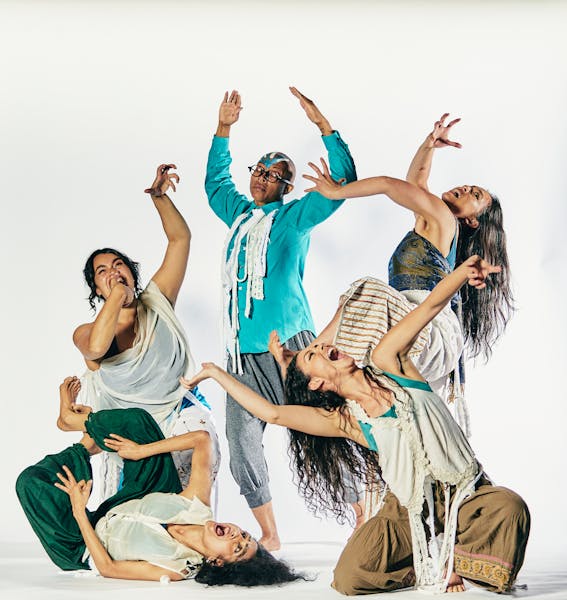Heading into the fall, dance companies have reorganized, reprioritized and regrouped, with new programs, new ideas and new spaces shaping their paradigms.
The monthlong Fall Forward Festival at Cowles Center is among the new programs that aim to bring different performing groups together in shared bills as a way to build audiences. For instance, Black Label Movement is teaming up with Zorongo Flamenco Dance Theatre and Crash Dance Productions during the third week of the festival, which runs Oct. 29-Nov. 20.
"I love that the Cowles Center is playing a role of connector and challenging groups to share space with companies that they wouldn't necessarily immediately reach out to," said Carl Flink, artistic director of Black Label that will present its Minnesota premiere of "Riding the Maelstrom."
For Cowles co-director Joseph Bingham, the program is "about getting artists who maybe haven't been on stage yet, and pairing them with artists who have." Among the new groups performing at the Cowles for the first time are Duniya Drum & Dance, a troupe that features rhythms and movements of the West African diaspora. It's also a debut performance on Cowles' main stage for Atlantis 13, co-founded by Jonathan "AJ" van Arneman of St. Martin and Peace Madimutsa of Zimbabwe.
"They're just an amazing collaborative of BIPOC [Black, Indigenous and people of color] artists that are really investigating work that is about their roots," Cowles' co-director Jessi Fett said.
Hijack, the choreographic duo of Kristin Van Loon and Arwen Wilder, have been making dances in the Twin Cities for nearly 30 years, but have never performed on the Cowles stage. They'll be working with 30 animated artificial plant sculptures created by artist Rachel Youn.
New spaces
Promising new venues ideal for dance have also hit the scene. Red Eye Theater's new digs at the Focus Arts building in Minneapolis' Seward neighborhood acts as a space for curated rentals. Erin Search-Wells, Sam Johnson and Jeffrey Wells of SuperGroup take the stage Nov. 2-5 to perform "Fine," which they co-present with Red Eye. Also in November, Pedra Pepa will showcase a new work called "Transubstan." Sayge Carroll will premiere a durational piece involving clay in December.
Minnesota Opera is renting its new Luminary Arts Center in the North Loop for dance shows as well.
"We're happy that we were able to preserve the space and give it a little face-lift," said Ryan Taylor, president and general director of the opera.
The former Lab Theater now features a sprung floor, which is safer and ideal for dancers, and acoustic treatments that make the space more flexible. The musical "We're Still Here" by Interact Center for the Visual and Performing Arts in October will feature the "Dust Bowl Dance," which will be performed by Naa Mensah who has Down syndrome.
New ideas
In some ways, the shutdowns and cancellations during the pandemic on top of the racial reckoning that sparked conversations about the way arts institutions operate, have also sparked new ideas. That includes the labor of making work, how it is compensated and valued, and how the arts can be used to bring communities together in new ways.
Rosy Simas Danse's "She Who Lives on the Road to War," which will be at the Weisman Art Museum and All My Relations Gallery, addresses some of those ideas. The dance piece and installation explores refuge and grieving using a model that focuses less on the final product of performance and more on the process.
Pramila Vasudevan, too, is rethinking the audience-performer relationship. Her "Nipple Disco," with DJ Chamun at the Red Eye in December, is part dance party, part performance, with breaks for the dancer woven into the structure.
"It's driven by a desire for help, and a desire to connect with the public," she said.
New choreographers
Part of these new conversations involve a deeper acknowledgment of the land where performances take place — including naming Indigenous stewards of the land and the history of those spaces.
Oogie, who has also been dancing for most of her life, is pushing these ideas forward as part of a residency program operated by Rosy Simas Danse. In her new piece, "The Adventures of a Traveling Meskwaki," she incorporates Native storytelling, drumming and movement.
"I consider it part storytelling, part water ceremony," said Oogie. "There is a sacredness to water that most people don't take time to acknowledge or appreciate, so I decided to share my own stories in hopes that others will remember how important water actually is and maybe they will also step up and help somehow."
Other choreographers to watch out for include Michael Walters and Arimee Gambill, who will have new works presented at James Sewell Ballet's "Breathe" in October. Walters employed a fresh theatricality in his work "Tryptych" earlier this year.
Munich-based Minnesota native Alexander Hille will premiere his "Divided We Fall" in October for Minnesota Dance Theatre, with whom he performed "The Nutcracker Fantasy" a decade ago. The St. Paul Conservatory for Performing Artists alum who went onto the Juilliard School will be assisted by fellow Juilliard grad Julia Eichten of Stillwater.
The piece pushes the conventions of ballet by featuring contorted angles and sculptural shapes. Hille seeks to communicate his personal experiences of being out of control and finding a way through it.
"I didn't set out to make a COVID reaction piece, but that's what it ended up being," he said.

The 5 best things our food writers ate this week

A Minnesota field guide to snow shovels: Which one's best?

Summer Camp Guide: Find your best ones here

Lowertown St. Paul losing another restaurant as Dark Horse announces closing

